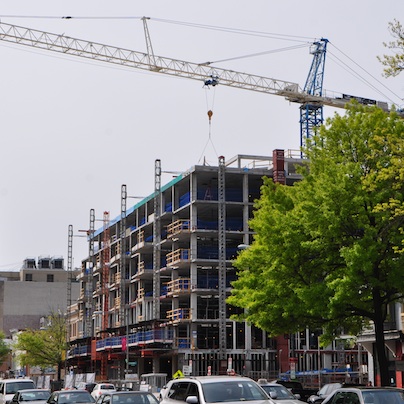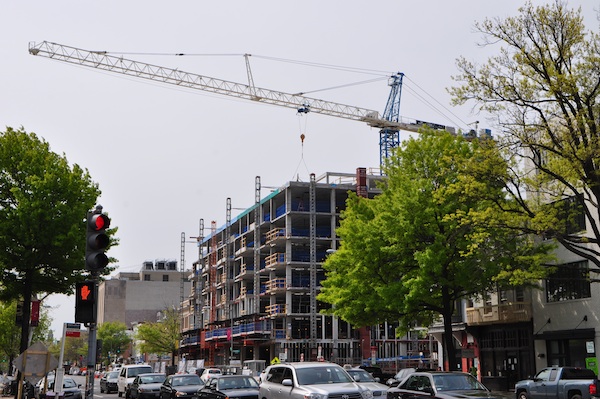Living
14th in flux
Rampant construction expected to bring hundreds of renters to Logan, beyond


A new apartment building being built across from the Black Cat on 14th Street NW in Washington. (Blade photo by Michael Key)
Construction on 14th Street N.W. in Washington is nothing new — anyone who frequents the uber-gay area has been seeing chain-link fences, closed sidewalks and cranes for months as various massive projects are underway. But with ground now broken for the Louis, the former Utopia spot at 14th and U that will be a mixed-use space featuring 267 new apartments and 30,000 square feet of retail street-level space, it feels like the whole stretch is one massive construction zone from about R to W.
With so many projects underway at once, what effect will all this ultimately have on the street? And what exactly is planned at each spot?
It’s an unusual part of town in the sense that past Thomas Circle and the downtown area, 14th varies extensively in character and nature. Much denser with commercial business than its 13th or 15th street neighbors, 14th encompasses parts of three different neighborhoods (Logan, Columbia Heights and the U Street corridor), several ANC zones and two city wards (one and two). It’s also a street that has seen massive change in the last decade. And if all the construction seems rather sudden, long-time residents and those following city zoning news know these projects have all been in the works for years. Much of the simultaneous ground breaking is due to financing now being more readily available than it was in the few years just after the 2008 stock market crash.
“Those of us who live here have known about these projects for five to six years,” says Ramon Estrada, the 2B09 ANC commissioner that encompasses part of the street. “When a project is approved by zoning, they have a two-year window but for some of these projects, that hit right in the middle of the recessions so they asked the ANC for extensions. We wanted these projects to be built so all we had to do was re-approve them.”
Among the projects underway are:
- The aforementioned Louis, a mixed-use project that will replace the Taco Bell/KFC and other shops formerly on the west side of 14th Street just south of U. The project, according to developer JBG, will be a nine-story, 267-unit apartment building with street-level retail space. JGB partnered with developer Georgetown Strategic Capital after their original plans stalled (the project was originally called Utopia). Construction started in February. JB and Georgetown Strategic Capital are working with architect Eric Colbert & Associates and interior designor Cecconi Simone on the project, according to Urban Turf, a site that monitors new condos and apartments coming to D.C.
- District Condos, another JBG project, is a 125-unit residential project being built at the corner of 14th and S, according to Urban Turf and other sources. This is the spot that was formerly a Whitman-Walker AIDS drop-in clinic. Originally planned as condos, the building will now be studio, one- and two-bedroom apartments.
- The massive Jefferson 14W project (Jefferson14w.com), a Perseus Realty and Jefferson Apartment Group project at 14th and W N.W. that will have 231 apartments, a 40,000 square-foot YMCA and 10,000 square feet of street-level retail that’s slated to be finished by fall.
- At 14th and Belmont (the 2400 block), a nine-story highrise that, according to the Prince of Petworth blog, will be 255 condos, street-level retail with underground parking and other amenities. This spot was formerly the Nehemiah Strip Mall.
- View 14 (view14.com) has been finished since 2010 (and has been sold) but still has retail space for rent and represents the new wave of development on the street. The 185-unit building was originally planned as condos but is now rental apartments.
- Level 2 Development plans a seven-story, 144-unit condo building at 1905 and 191714th Street, by the Carpet & Furniture shop. This project is more in the planning stage and has met with some opposition from residents.
- Two condo buildings are going in at14th and R — one in the Verizon building, the other in the former auto repair shop beside Miss Pixie’s. Look for between 30 and 40 condos in each.
Several gay D.C. residents the Blade spoke with said the changes are mostly positive.
“I think first of all on the14th Street corridor there was just enough land available for some of these really cool projects,” says Evan Johnson, a local Realtor who’s gay and has an eponymous real estate group. “Whether they’re apartments or condos, I’d obviously prefer condos since I’m in the sales side, but either way, the more residents it brings in, that brings the opportunity build more stores … I think it provides a tremendous opportunity to clean up some of the older buildings that needed attention and it’s still close enough to Dupont and Logan … that it’s a highly sought-after area. I don’t see any real negative impact.”
As the projects were being considered, City Councilmember Jim Graham (Ward 1) said he had some concerns, but they’ve been addressed.
“I’m certainly glad we’re keeping the post office,” Grahm, who’s openly gay, says. “They will have ground floor space with street access at the Reeve building. I welcome all this new activity because we have worked very hard and very successfully to keep our low income housing. Many of the big buildings north of Florida Avenue are low income apartment buildings which we have not only preserved, but they’ve also been rehabilitated all the way north of the Target. We haven’t lost that diversity and that’s very important as we welcome new people into the area.”
Tim Christensen, president of the Logan Circle Community Association and a Logan resident since 1989, says there are some concerns Logan residents have such as parking restrictions and extended hours for liquor sales, but he’s been active in voicing his concerns and those of his neighbors with their ANC elected officials.
“I’m a huge fan of mixed-use development and we’ve seen a lot of it in Logan through the years,” Christensen, who’s gay, says. “I think one of the biggest challenges for our businesses will be making sure they have enough foot traffic throughout the daytime on Mondays through Fridays. They’re fine in the evenings and on weekends when you have a lot of foot traffic, but if it’s very quiet in these areas during the work week, that can really mean the difference between success and failure for some of our businesses.”
And as for the hustle and bustle of the actual construction? Estrada says he hasn’t heard any significant grumbling about it.
“I think it’s just a temporary inconvenience. All of these neighbors are aware of the extent of how big these projects are so I think everybody is dealing with it just fine. I haven’t received any complaints.”
And why are so many rentals over condos? The reasons, observers say, are complicated. According to Mark Wellborn, editor-in-chief of Urban Turf, large projects have to meet certain sale/percentage benchmarks with non-government financing before they can proceed. Since government-backed financing through entities like FHA, Fannie Mae and Freddie Mac are how most buyers proceed, that can stymie construction. Projects with rentals don’t have the same requirements.
Observers predict the apartments, once finished, will rent for about $2,500 a month for a one-bedroom and will bring a 15-18 percent increase in residents to the area likely to match a similar spike the area saw since the 2000 census. The new residents are not expected to drastically alter the percentage of LGBT residents in Logan or Columbia Heights.
“I think it will be good for gay people overall,” Graham says.
Autos
Sport haulers: Jeep Grand Cherokee, Mercedes GLE-Class
Updated cabins, adept handling, and more

Now that March Madness and the Masters are over, it’s time for, well, everything else. For my husband and me, this means water sports, as in kayaks and rowing sculls, which is why we trekked to the Potomac for the George Washington Invitational regatta last weekend.
Alas, high winds splashed cold water on the event, canceling much of it. But there was still plenty of spirited camaraderie to rival “The Boys in the Boat.”
And I was reminded of my time years ago as a rower with D.C. Strokes, ferrying teammates to races up and down the East Coast. Back then my ride was a dated, rather cramped four-door sedan.
If only we could have paddled around in a sporty SUV like the two reviewed here. Now that would have been some smooth sailing (wink-wink).
JEEP GRAND CHEROKEE
$40,000
MPG: 19 city/26 highway
0 to 60 mph: 7.5 seconds
Maximum cargo room: 37.7 cu. ft.
PROS: Updated cabin, adept handling, strong towing
CONS: So-so gas mileage, no third row, pricey trim levels
IN A NUTSHELL: Rough, tough and buff. It’s doesn’t get much more butch than a Jeep. This year’s Grand Cherokee is no exception, with rugged looks, expert off-road capability and better-than-average towing capacity of 6,200 pounds.
There are a dizzying number of trim levels—more than a dozen—starting with the barebones base-model Laredo at an affordable $40,000. The lineup tops out with the Summit Reserve 4xe PHEV, which is almost twice the price at $76,000 and one of various plug-in hybrid versions available. Those plug-in hybrids can drive up to 25 miles on all-electric power before the four-cylinder gas engine kicks in. Otherwise, you can choose from a standard V6 or V8. Gas mileage on all trim levels is basically the same as the competition.
Where the Grand Cherokee really shines is in the handling. More refined than a Wrangler but less lavish than a Land Rover, this Jeep maneuvers just as well on city streets and highways as it does on bumpier terrain.
I tested the mid-range and mid-priced Overland, which comes standard with four-wheel drive and large 20-inch wheels. It also boasts a slew of niceties, such as quilted upholstery, panoramic sunroof and high-tech digital displays. These include a 10.25-inch infotainment touchscreen and rear-seat entertainment system.
The nine-speaker Alpine stereo, designed specifically for the Grand Cherokee, is pleasing. But I really wanted to hear the boffo 19-speaker McIntosh surround-sound system that Jeep also offers. Sigh, it’s only available on the premium Summit trim level.
MERCEDES GLE-CLASS
$64,000
MPG: 20 city/25 highway
0 to 60 mph: 6.6 seconds
Maximum cargo room: 33.3 cu. ft.
PROS: Lush interior, silky-smooth suspension, speedy
CONS: Some confusing electronics, tight third row, many competitors
IN A NUTSHELL: For a more high-class hauler, there’s the Mercedes GLE-Class. This midsize SUV is similar in size to the Jeep Grand Cherokee. But instead of seating five passengers, the GLE can carry up to seven. Sure, legroom in the optional third row may be tight for taller travelers, but it’s perfect for a cocky cockswain or two.
Six trim levels, ranging from the base-model GLE 350 to two high-performance AMG models. For eco-conscious buyers, the GLE 450e plug-in hybrid arrived earlier this year and can run on battery power alone for almost 60 miles.
My test car was the top-of-the-line AMG 63 S 4Matic, a head-turner in every way. Priced at a whopping $127,000, this GLE looks best in glossy black with the Night Package, which includes tasteful jet-black exterior accents and matte-black wheels. To complete the Darth Vader effect, there’s a deep, menacing exhaust rumble that’s downright threatening.
You expect such a ride to be wicked fast, and it is: 0 to 60 mph in a blistering 3.7 seconds. Yet the carbon ceramic brakes with their devil-red calipers are equally impressive in slowing things down quickly.
Inside, each GLE comes with two large digital displays on the elegantly sculpted dashboard. My favorite feature is the “Hey Mercedes” digital assistant, which responds to voice commands such as opening or closing the sunroof, operating the infotainment system or activating the climate controls.
It’s hard to find sport seats that are more comfortable, especially with the heavenly massage function (though those massage controls could be a bit more user-friendly.) For AMG models, the seats come with red-contrasting stitching and red seatbelts—a nod to the devilish demeanor under the hood.
Considering all the SUVs available in showrooms, few make quite the splash of a GLE.

Real Estate
Boosting your rental property’s curb appeal
Affordable upgrades to attract and keep tenants happy

In the District of Columbia, the rental market tends to open up significantly during the springtime for several reasons. First, spring brings about a sense of renewal and change, prompting many individuals and families to seek new living arrangements or embark on relocations. Additionally, the warmer weather and longer daylight hours make it more conducive for people to explore housing options, attend viewings, and make decisions about moving. Furthermore, spring often coincides with the end of academic terms, leading to an influx of students and young professionals entering the rental market.
Landlords and property managers also tend to schedule lease renewals or list new vacancies during this time, capitalizing on the increased demand and ensuring a steady turnover of tenants. In the competitive world of rental properties, attracting and retaining quality tenants can be challenging. However, with some strategic upgrades, property owners can significantly enhance their units’ appeal without breaking the bank. From enhancing curb appeal to interior upgrades, here are some practical and cost-effective ideas to make your rental property stand out in the market.
Curb appeal
First impressions matter, and curb appeal plays a crucial role in attracting potential tenants. Simple enhancements like freshening up the exterior paint, adding potted plants or flowers, and ensuring a well-maintained lawn can instantly elevate the property’s appearance. Installing outdoor lighting not only adds charm but also enhances safety and security.
Interior upgrades
Upgrade the kitchen and bathroom fixtures to modern, energy-efficient options. Consider replacing outdated appliances with newer models, which not only appeal to tenants but also contribute to energy savings. Fresh paint and updated flooring can transform the look of a space without a hefty investment. Additionally, replacing worn-out carpets with hardwood or laminate flooring can make the unit more attractive and easier to maintain.
Enhance storage
Maximize storage options by installing built-in shelves, cabinets, or closet organizers. Tenants appreciate ample storage space to keep their belongings organized, contributing to a clutter-free living environment.
Improve lighting
Brighten up the interiors by adding more lighting fixtures or replacing old bulbs with energy-efficient LED lights. Well-lit spaces appear more inviting and spacious, enhancing the overall ambiance of the rental unit.
Upgrade window treatments
Replace outdated curtains or blinds with modern window treatments that allow natural light to filter in while offering privacy. Opt for neutral colors and versatile styles that appeal to a wide range of tastes.
Focus on security
Invest in security features such as deadbolts, window locks, and a reliable alarm system to ensure the safety of your tenants. Feeling secure in their home is a top priority for renters, and these upgrades can provide meaningful, genuine peace of mind.
Enhance outdoor spaces
If your rental property includes outdoor areas like a patio or balcony, consider sprucing them up with comfortable seating, outdoor rugs, and potted plants. Creating inviting outdoor spaces expands the living area and adds value to the rental property.
As landlords, investing in the enhancement of your rental properties is not merely about improving aesthetics; it’s about investing in the satisfaction and well-being of your tenants, and ultimately, in the success of your investment. By implementing these practical and affordable upgrades, you’re not only increasing the desirability of your units but also demonstrating your commitment to providing a high-quality living experience.
These efforts translate into higher tenant retention rates, reduced vacancy periods, and ultimately, a healthier bottom line. Moreover, by prioritizing the comfort, safety, and happiness of your tenants, you’re fostering a sense of community and trust that can lead to long-term relationships and positive referrals. So, let’s embark on this journey of transformation together, turning rental properties into cherished homes and landlords into valued partners in creating exceptional living spaces.
Scott Bloom is owner and Senior Property Manager of Columbia Property Management. For more information and resources, visit ColumbiaPM.com.
Real Estate
Real estate agents work hard for that commission
Despite recent headlines, buyers and sellers benefit from our expertise

With there being a lot of noise in the media lately as I am sure you have read and heard headlines like “Gone are the days of the 6% commission” and “End of the good days of Realtors,” etc., I wanted to re-run a very short article of the long laundry list of things that well versed real estate agents bring to the table to earn that seldom 6% commission. It’s typically split in half and it has always been negotiable).
As a real estate professional you will go on listing appointments and buyer meetings to not only attempt to gain business but in doing so you also educate the general public on what it is that we as real estate professionals do. I know what you’re thinking – and if you’ve seen my photo before you wouldn’t be wrong to assume that I am cast in “Selling DC” as the lead villain. I am just waiting for that phone call! But in all seriousness, when I sit down to come up with a list of things to prove to prospective clients the value in working with me as their real estate professional, I am pretty blown away at the items and qualities that a trusted professional representing you in a real estate transaction is responsible for managing a myriad of tasks, including but not limiting to the following:
• Have a pulse on the marketplace to truly understand exactly what is happening from a buying and selling standpoint while also understanding the economic side of things – not just looking at interest rates. Why are rates where they are? What employers are laying off and could cause an influx of inventory? What are the trends for individuals moving IN or OUT of an area looking like? Forecasting the marketplace of all things that truly affect real estate is vital.
• Soft Skills – these are the skills often considered as customer service skills. The ability to be approachable by all types of people and ensure that you are open to receive information. Also – when telling you bad news – it’s important to ensure that it is done in a manner in which you, the receiver, will be pleasantly receptive.
• Pre-market vendors – not only are real estate professionals expected to market your home for sale or locate a home for you to purchase, we are also expected to have a list of pre-market vendors to which you can use for your lending needs, home inspection, title work, any fluffing and buffing needed pre market for the sale of your home such as a contractor, painter, landscaper etc. We have a book of extremely well vetted vendors that either I personally have used or past clients have used that can assist with your needs. This beats Googling for hours and accidentally choosing the wrong contractor. Section A of the pre-market vendor list includes those in which we real estate professionals use for marketing materials for your property – we will use the best photographers, have floor plans drawn for your property, video, staging, catering for brokers opens and the list goes on. Again – this is a well vetted list that we have worked on for years and done all of the heavy lifting and had those uncomfortable conversations when things are not properly executed – so you don’t have to.
• On Market Tasks – these are the tasks that most clients are unaware that we do. Oftentimes when a listing is on market – folks think that I am just cruising around in my convertible buying nice things. However I am in fact going around checking each listing on market to ensure that they are clean, the booties are replaced, marketing materials are stocked, light bulbs are all working, staging looks crisp and the list truly goes on. That of course, doesn’t include the tasks we do to properly market the property such as weekly email blasts, reaching out several times to follow up with showing agents to get their feedback, check the market to see what our competition looks like, what’s under contract and why, and again…..I could go on. Needless to say the most important and time consuming tasks are those that are done when the property is on market.
• “Contract to close” management – the term contract to close is pretty much what it sounds like – it’s what happens from the time we go under contract until we reach the closing finish line and you have those keys. Once a trusted real estate professional has fiercely negotiated on your behalf as a buyer, the fun starts. Again pops up this vendor list – helping guide you though selection of a home inspector, termite inspector, etc. for the inspections. A title attorney is needed (depending on your jurisdiction) and any other vendors for quotes like renovations, etc., that you might want done to the property. Once the inspection is completed and we go through possible re-negotiations then we must ensure that the lender has the documents needed from you completed in order to have the appraisal done to prove the value of the home you are under contract for. Now we are getting into the weeds – but once we are on the other side of things and the appraisal comes back at value and the loan is clear to close then we are at the finish line to your new home.
A similar story can be told if you are selling your home. The appraisal is a very important part of the checklist as that is the value in which your home is worth. The appraiser is a third party that neither the buyer, seller, lender or myself have any allegiance to. I do, however, have the duty to educate said appraiser on why I chose the listing price and how I came up with that value.
• Post-market vendors. As mentioned before, a real estate professional should have a book of well vetted vendors from which to choose. Looking at the list of vendors now that we are on the other side of the table – I can provide a cleaning person, HVAC contractor, someone to repair the sprinkler system, a dog walker, the best caterers and bakery in town. Further down the road I am able to provide a wonderful wealth manager who can tell you what to do with that piece of real estate you purchased some time ago and we could go on for days.
While you are fully entitled to not use a real estate agent during your real estate transaction, I do believe that it is well within the realm of possibilities to say that without one there would be loose ends not completely tied up, things mismanaged and possible delays that could cost real cash. All of that aside, it is also such a truly wonderful experience to work alongside a trusted professional that at the end of the transaction becomes a new friend and family member. Real estate professionals love what they do, they love real estate and people and sheepherding you through the home buying or selling process is what it’s all about to us.
Justin Noble is a Realtor with Sotheby’s international Realty licensed in D.C., Maryland, and Delaware for your DMV and Delaware Beach needs. Specializing in first-time homebuyers, development and new construction as well as estate sales, Justin is a well-versed agent, highly regarded, and provides white glove service at every price point. Reach him at 202-503-4243, [email protected] or BurnsandNoble.com.
-

 State Department3 days ago
State Department3 days agoState Department releases annual human rights report
-

 Maryland4 days ago
Maryland4 days agoJoe Vogel campaign holds ‘Big Gay Canvass Kickoff’
-

 Politics3 days ago
Politics3 days agoSmithsonian staff concerned about future of LGBTQ programming amid GOP scrutiny
-

 District of Columbia19 hours ago
District of Columbia19 hours agoCatching up with the asexuals and aromantics of D.C.











